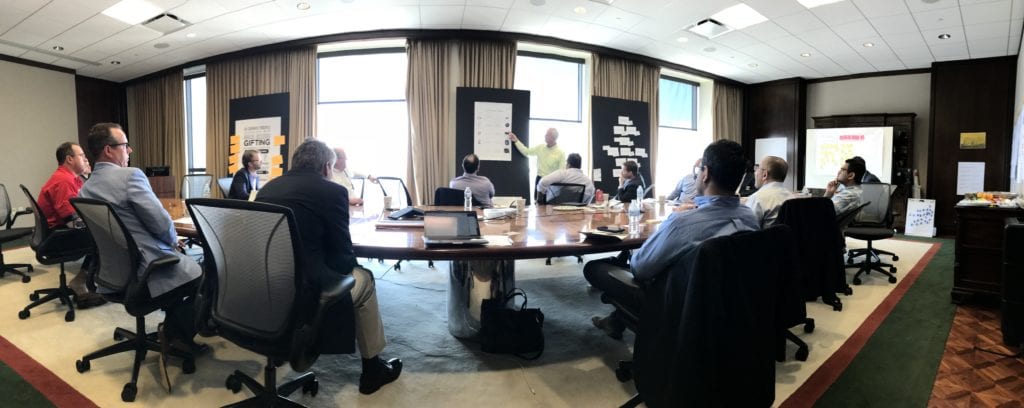Insights From the IoT “Un-conference” on the Commercialization Gap
Insights From the IoT “Un-conference” on the Commercialization Gap
- Last Updated: December 2, 2024
Tim Ogilvie
- Last Updated: December 2, 2024



IoT conferences 2018 - Cheap sensors and always-on connectivity make it possible to connect almost anything to the Internet. Behind this tantalizing possibility, however, is an unpleasant reality: the business case for IoT is often elusive.
I know this challenge first-hand. Since 1999, I’ve been connecting physical things to the Internet. The list includes mailboxes, retail signage, building doors, trucks, hospital beds, refrigerators, and crops -- all with a mixed record of successes and failures.

Last month, a group of IoT leaders came together for a one-day summit moderated by Peer Insight Ventures to discuss how to close the IoT commercialization gap. A community of 18 people convened at Georgia-Pacific headquarters in Atlanta to discuss “The Commercial Truth of IoT.” The participants were from nine companies that included Cox Communications, NCR Corporation, Goodyear, DTE Energy, Owens & Minor, and Georgia-Pacific Professional.
These firms share a common challenge.
They have world-class products and amazing technological prowess. Yet not every IoT application solves an urgent customer problem, or has a scalable business model. That’s what these pioneers are working together to solve.
Peer Insight Ventures facilitated the forum using a unique “un-conference” format: no competitors, no presentations, and no selling. The resulting culture of generosity and openness was essential to meet the shared goals. “We have strong IoT offerings, but IoT platforms are early in their evolution,” said Mike Slawson, vice president and general manager, Georgia-Pacific Professional. “We brought these firms together to explore what’s possible, and to push ourselves to the next level.”
The participants discussed the various challenges of the IoT commercialization gap and selected three focus areas:
- Revenue model validation
- Monetizing data analytics while protecting customer privacy
- Partnering for proof of concept
We conducted deep dives into these topics by asking participants what’s working, what’s missing, and what’s next. “It was the best organized, freshest brainstorming session I attended in quite a while,” said Barak Weinisman, General Manager of Cox2M. “The cohort worked together in a very inspiring way.”
Here are some example quotes that characterized the dialog.
On revenue model validation:
“We put all our emphasis on selling the solution to a third party, and not enough on selling it -- realistically -- to our internal sponsor. For every dose of hype to the market, we need a dose of stay-the-course, watch-the-milestones selling internally.”
“Finding the right early adopter is key. For example, selling to fixed (retail) space is hard. How much they’re gonna pay for it is questionable. But selling to a pop-up, that was like a light went on. Once you’ve proven that, once the pop-up became smart, then you can do a pop-in.”
On monetizing data analytics:
“Too often the data we try to sell is incomplete. We would try to sell the What, before we had connected it to the So What -- what does it mean to the customer? (Today) we use a (rubric for data analytics) that defines What, So What, and Now What. That’s the trifecta, that’s the standard.”
“The realization of data value depends very much on visualization. It’s funny, manufacturing floors shifted to visual management 30 years ago, but somehow we thought computer screens would make it OK to look at (data in) tables. It isn’t.”
On partnering for proof of concept:
“(Commercial) trials have to be smaller, then you can set temporary terms between the partners and revisit the relationship at the end. Everyone benefits if you lower the stakes and say ‘It’s just a 30-day proof-of-concept.’”
As the discussion unfolded, we could see new rules of thumb beginning to emerge. Some are old-school (good stakeholder management) while others are very IoT-specific (rubrics for monetizing data analytics). But in each case, the know-how gap between building an IoT solution and monetizing it is being narrowed month by month.
The Most Comprehensive IoT Newsletter for Enterprises
Showcasing the highest-quality content, resources, news, and insights from the world of the Internet of Things. Subscribe to remain informed and up-to-date.
New Podcast Episode

IoT and AI in 2026
Related Articles


